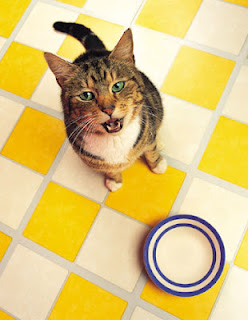A cat food ad states “We know what every indoor cat needs- a big window, sunshine, healthy skin and fur” The pretty kitty sitting in a window may give the appearance of being healthy and safe; but there are dangers to his health, even if he never goes outdoors. The person who really knows what your indoor cat needs to enjoy life to the fullest is your veterinarian. Your cat’s doctor will make sure he is healthy both inside and out.
One misconception is that indoor cats do not need to receive vaccinations. An indoor cat needs to be protected against diseases that can come in even if he does not go out. Rabies is the most serious of the viruses to which an indoor cat can be exposed. The most common carrier is a bat. Many owners have come home to discover their cat has cornered or killed a bat. An unvaccinated cat needs to be quarantined. If the bat tests positive and the cat is not current on its rabies vaccine, the authorities’ first recommendation would be to have the cat euthanized. The other option is strict isolation for three months in a facility equipped to handle those stringent requirements. Then three months of strict home confinement. Indoor cats also can become ill by exposure to upper respiratory viruses, which are very hardy and can live outside the body for 10 to 14 days. There are cats that shed virus but show no signs of illness. An owner may pet a seemingly healthy cat and bring the virus home.
Infectious diseases are not the only risks for an indoor cat. Some issues are more common if a cat lives indoors: obesity, psychological disorders resulting from boredom ( for example-overgrooming or destructive behavior). Your doctor will make recommendations to prevent or correct these problems. ( See previous blog, “ Do we really know what it takes to keep a cat happy”.) Many health concerns, such as diabetes, thyroid disease, arthritis, or intestinal disorders can remain undetected until they are so severe they are obvious, even to an untrained eye. Unfortunately, the cat may have been in pain for quite a while or it may be too late to treat the illness successfully or without great expense.
Keeping your cat indoors increases the likelihood that he will live a long life. However Abraham Lincoln’s bromide that “in the end it is not just the years in a life that count, but the life in the years” applies to our feline friends too. Regular veterinary care will maximize the probability that your indoor cat will live not just the longest but the best possible life.
Originally published at FelineDocs.

No comments:
Post a Comment